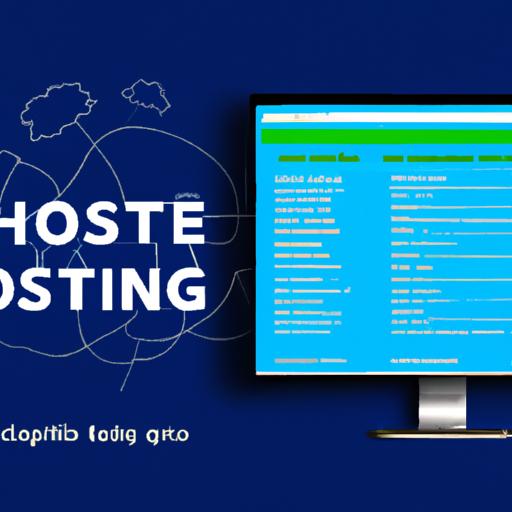Cloud Storage Web Hosting: Empowering Your Online Presence
As we navigate the dynamic digital landscape, it’s crucial to leverage the power of cloud storage web hosting to ensure a seamless online experience. In this article, we’ll dive into the world of cloud storage web hosting, exploring its definition, importance, and the myriad benefits it offers. So, buckle up and let’s embark on this exciting journey together.
A. Definition and Importance of Cloud Storage Web Hosting
Imagine having your website’s data securely stored and readily accessible from anywhere in the world. That’s precisely what cloud storage web hosting offers. Unlike traditional hosting methods, where data is stored on physical servers, cloud storage web hosting utilizes a network of virtual servers to store and manage your website’s files, ensuring maximum efficiency and reliability.
The importance of cloud storage web hosting cannot be overstated. It provides businesses with the flexibility to scale their operations effortlessly, adapt to changing demands, and optimize resource allocation. Whether you’re a small startup or a multinational corporation, cloud storage web hosting empowers you to focus on your core business activities while leaving the technicalities to the experts.
B. Benefits and Advantages of Using Cloud Storage Web Hosting
-
Scalability: With cloud storage web hosting, you have the freedom to scale your storage capacity dynamically. Whether you’re experiencing sudden spikes in traffic or expanding your online presence, cloud hosting allows you to scale up or down seamlessly, ensuring your website performs optimally at all times.
-
Reliability and Redundancy: Traditional hosting methods often suffer from a single point of failure, leading to potential downtime. However, cloud storage web hosting eliminates this risk by distributing your data across multiple servers. This redundancy ensures that even if one server fails, your website remains accessible, minimizing any disruption to your online presence.
-
Enhanced Security: Protecting your valuable data is paramount in today’s digital landscape. Cloud storage web hosting offers robust security measures, including encryption, firewalls, and regular backups, safeguarding your website and customer information from potential threats.
-
Cost-effectiveness: Cloud storage web hosting enables businesses to optimize their expenditures. With traditional hosting, you’re often required to invest in expensive hardware and infrastructure. In contrast, cloud hosting eliminates these upfront costs, allowing you to pay for the resources you actually use, making it a more cost-effective solution.
By embracing cloud storage web hosting, you unlock a world of possibilities for your online presence. Stay tuned as we delve deeper into the intricate features, selecting the right provider, implementation strategies, future trends, and more. Together, we’ll navigate this exciting realm and empower your digital success.
Understanding Cloud Storage
In this section, we’ll unravel the concept of cloud storage and explore its key differentiators from traditional hosting methods. Additionally, we’ll delve into the remarkable scalability and flexibility that cloud storage offers, revolutionizing the way we manage and store data.
A. Explaining the Concept of Cloud Storage
Cloud storage, at its core, refers to the practice of storing data on remote servers accessed through the internet. Unlike traditional hosting, where data is stored on physical servers located in a specific location, cloud storage leverages a network of virtual servers spread across multiple data centers worldwide. This distributed infrastructure ensures that your data is accessible from anywhere, at any time, with just an internet connection.
B. Differentiating Between Traditional Hosting and Cloud Hosting
To truly grasp the power of cloud storage, it’s essential to understand its key differences from traditional hosting methods. Traditional hosting relies on physical servers, often limited to a single location, making scalability and geographical accessibility challenging. In contrast, cloud hosting utilizes a network of virtual servers, allowing for seamless scalability, enhanced performance, and improved reliability.
Cloud hosting also eliminates the need for physical hardware maintenance and upgrades, as these responsibilities are shifted to the cloud service provider. This not only reduces costs but also frees up valuable time and resources for businesses to focus on core competencies.
C. Highlighting the Scalability and Flexibility of Cloud Storage
One of the most remarkable aspects of cloud storage is its unrivaled scalability and flexibility. With traditional hosting, scaling up or down often involves complex processes, such as upgrading hardware or migrating to a new server. In contrast, cloud storage offers a seamless and on-demand scalability. Whether you need to handle sudden spikes in traffic or accommodate business growth, cloud hosting allows you to scale your storage capacity effortlessly, ensuring optimal performance without any disruption.
Moreover, cloud storage provides the flexibility to adapt to changing business needs. As your requirements evolve, you can easily adjust your storage capacity, add or remove resources, and customize your hosting environment. This agility empowers businesses to respond swiftly to market trends, customer demands, and ever-evolving technological landscapes.
Understanding the essence of cloud storage sets the foundation for harnessing its full potential. In the upcoming sections, we’ll explore the key features of cloud storage web hosting, guide you in selecting the right provider, and provide practical implementation strategies to leverage this powerful technology for your business. Stay tuned as we unlock the secrets of cloud storage web hosting success.
Key Features of Cloud Storage Web Hosting
In the realm of cloud storage web hosting, a multitude of features elevate its functionality and make it a compelling choice for businesses of all sizes. Let’s explore some of the key features that set cloud storage web hosting apart from traditional hosting methods.
A. Data Redundancy and Reliability
One of the standout features of cloud storage web hosting is its ability to ensure data redundancy and reliability. By distributing your website’s data across multiple servers, cloud hosting minimizes the risk of data loss or downtime. Even if one server experiences an issue, your data remains accessible from other servers, providing uninterrupted service to your visitors. This robust redundancy ensures peace of mind, allowing you to focus on your core business activities without worrying about potential data loss.
B. High-Level Security Measures
Security is a top priority in today’s digital landscape, and cloud storage web hosting excels in this aspect. Reputable cloud hosting providers implement stringent security measures to protect your website and valuable data. These measures often include advanced encryption protocols, firewalls, intrusion detection systems, and regular backups. By entrusting your data to a reputable cloud hosting provider, you can rest assured that your website is shielded from cyber threats, ensuring the privacy and trust of your customers.
C. Ease of Access and Remote File Management
Cloud storage web hosting offers unparalleled convenience when it comes to accessing and managing your website’s files. With a few clicks, you can securely access your data from anywhere in the world, eliminating the need for physical storage or being tied to a single location. This flexibility empowers you to collaborate with team members, update content on the go, and streamline your workflows. Additionally, cloud hosting often provides user-friendly interfaces and intuitive file management systems, making it effortless to organize and control your website’s files.
D. Cost-Effective Solutions for Businesses
For businesses of all sizes, optimizing costs is a crucial aspect of sustainable growth. Cloud storage web hosting offers an attractive cost-effective solution compared to traditional hosting methods. With cloud hosting, you only pay for the resources you need, allowing you to scale your storage capacity and compute power as your business grows. This pay-as-you-go model eliminates the need for significant upfront investments in hardware and infrastructure, making cloud hosting an economically viable choice for businesses looking to maximize their operational efficiency.
In the next section, we’ll delve into the process of selecting the right cloud storage web hosting provider. Join me as we navigate the intricate landscape of evaluating storage capacity, security protocols, pricing models, and service-level agreements to ensure you make an informed decision for your business.
Choosing the Right Cloud Storage Web Hosting Provider
When it comes to selecting a cloud storage web hosting provider, making an informed decision is crucial. With a myriad of options available, it’s important to consider several factors to ensure seamless performance and reliability for your online presence. Let’s explore the key considerations that will guide you towards choosing the right provider.
A. Factors to Consider When Selecting a Provider
-
Reputation and Experience: Begin by assessing the provider’s reputation and experience in the industry. Look for well-established providers with a track record of delivering reliable and secure cloud storage web hosting services. Check customer reviews and testimonials to gain insights into their performance and customer satisfaction levels.
-
Technical Support: Reliable and responsive technical support is paramount in the world of cloud storage web hosting. Ensure that the provider offers 24/7 technical support, including live chat, phone support, or ticketing systems. Prompt assistance can make a significant difference in resolving any issues that may arise and minimizing downtime.
B. Evaluating Storage Capacity and Scalability Options
-
Storage Capacity: Assess your current and future storage needs to determine the required storage capacity. Ensure that the provider offers sufficient storage space to accommodate your website’s files, databases, and any additional data you may need to store.
-
Scalability Options: Consider the provider’s scalability options. Your website may experience fluctuations in traffic and resource requirements. Ensure that the provider allows you to easily scale up or down your storage capacity as needed, without any disruptions to your website’s performance.
C. Assessing Security Protocols and Data Backup Procedures
-
Security Protocols: Prioritize the security measures implemented by the provider. Look for providers that offer encryption, firewalls, and other robust security protocols to safeguard your data from potential breaches and cyber threats.
-
Data Backup Procedures: Adequate data backup procedures are essential to protect your website’s data from accidental loss or hardware failures. Ensure that the provider employs regular and automated backup procedures, preferably with off-site storage, to ensure the safety and availability of your data.
D. Comparing Pricing Models and Service-Level Agreements
-
Pricing Models: Evaluate the pricing models offered by different providers. Compare the costs, including setup fees, monthly fees, and any additional charges for exceeding storage limits or data transfer. Consider your budget and the value provided by each provider in relation to their pricing structure.
-
Service-Level Agreements (SLAs): Review the provider’s service-level agreements to understand their commitments regarding uptime, performance, and support response times. Look for providers with strong SLAs to ensure that they can deliver the level of service and reliability your website requires.
By carefully considering these factors, you’ll be able to choose a cloud storage web hosting provider that aligns with your specific requirements and sets the foundation for a successful online presence. Stay tuned as we explore the practical aspects of implementing cloud storage web hosting for your business.
Implementing Cloud Storage Web Hosting for Your Business
Now that we understand the benefits and advantages of cloud storage web hosting, let’s explore how to implement this powerful solution for your business. In this section, we’ll discuss the necessary steps to migrate your data to the cloud, integrating cloud storage with your existing systems, training your employees, and optimizing the performance of your cloud storage solution.
A. Steps to Migrate Data to the Cloud
Migrating your data to the cloud might initially seem like a daunting task, but with proper planning and execution, it can be a smooth and efficient process. Here are some essential steps to consider:
-
Data Assessment: Start by evaluating your existing data infrastructure and identifying the data that needs to be migrated. Categorize your data based on its importance and sensitivity to determine the appropriate security measures.
-
Choose the Right Provider: Select a reputable cloud storage web hosting provider that aligns with your business requirements and offers seamless migration services. Ensure that the provider has adequate data transfer capabilities and guarantees data integrity during the migration process.
-
Backup and Testing: Before initiating the migration, it’s essential to create backups of your data to avoid any potential loss. Once the backup is complete, perform thorough testing to ensure data integrity and compatibility with the cloud storage system.
-
Migration Execution: Begin migrating your data in stages, starting with less critical data and gradually moving towards more essential information. Monitor the process closely, resolve any issues promptly, and perform regular checks to ensure the successful transfer of your data to the cloud.
B. Integrating Cloud Storage with Existing Systems
To leverage the full potential of cloud storage web hosting, seamless integration with your existing systems is crucial. Consider the following steps:
-
System Evaluation: Assess your current IT infrastructure and identify the systems that can be integrated with cloud storage. Determine the compatibility of your applications, databases, and software with the cloud environment.
-
API Integration: If your existing systems support it, leverage the Application Programming Interfaces (APIs) provided by your cloud storage provider to establish smooth communication and data transfer between your systems and the cloud.
-
Data Synchronization: Implement robust synchronization mechanisms to ensure that data stored in the cloud and your on-premises systems remain up to date and consistent. This synchronization will enable real-time collaboration, data accessibility, and improved workflow efficiency.
C. Training Employees on Using Cloud Storage Effectively
Transitioning to cloud storage web hosting requires proper training and education for your employees. Consider the following steps to ensure a smooth adoption process:
-
Educate on Benefits: Conduct training sessions to familiarize your employees with the benefits and advantages of cloud storage web hosting. Emphasize how it streamlines their work processes, enhances collaboration, and improves data accessibility.
-
Navigation and Usage: Provide hands-on training on how to navigate the cloud storage interface, upload and manage files, and share resources securely. Ensure your employees understand the various features and functionalities available to them.
-
Data Security and Compliance: Educate your employees about data security best practices, emphasizing the importance of strong passwords, encryption, and proper data handling. Ensure they understand any compliance requirements specific to your industry.
D. Monitoring and Optimizing Cloud Storage Performance
To ensure optimal performance of your cloud storage solution, continuous monitoring and optimization are essential. Consider the following strategies:
-
Performance Metrics: Define key performance indicators (KPIs) to measure the effectiveness of your cloud storage solution. Monitor metrics such as response time, uptime, and data transfer speeds to identify areas for improvement.
-
Resource Allocation: Regularly assess your resource utilization and adjust your storage capacity and computing resources accordingly. Scaling up or down as required will help you optimize costs and maintain peak performance.
-
Regular Audits: Conduct periodic audits of your cloud storage solution to identify any security vulnerabilities or potential bottlenecks. This will allow you to proactively address issues and ensure the integrity and reliability of your data.
By following these implementation strategies, you can seamlessly transition to cloud storage web hosting, empowering your business with enhanced data management, collaboration, and efficiency. In the next section, we’ll explore future trends and considerations in the world of cloud storage web hosting. Stay tuned!
Future Trends and Considerations in Cloud Storage Web Hosting
As technology continues to evolve at a rapid pace, it’s essential to stay ahead of the curve when it comes to cloud storage web hosting. Let’s explore some future trends and considerations that will shape the landscape of this dynamic industry.
A. Emerging Technologies and Advancements in Cloud Storage
The world of cloud storage web hosting is continuously evolving, with new technologies emerging to enhance its capabilities. One such technology is edge computing, which brings computing resources closer to the end-users, reducing latency and improving performance. Additionally, advancements in artificial intelligence and machine learning are revolutionizing how data is managed, providing intelligent insights and predictive analytics to optimize storage efficiency.
B. Addressing Potential Challenges and Risks
While cloud storage web hosting offers numerous benefits, it’s crucial to address potential challenges and risks associated with this technology. One of the key concerns is data security and privacy. As businesses increasingly rely on cloud storage, ensuring robust security measures, including encryption, access controls, and regular audits, becomes paramount to protect sensitive information.
Another challenge is vendor lock-in, where businesses become dependent on a specific cloud storage provider, limiting their flexibility and potentially increasing costs. To mitigate this risk, organizations should consider implementing multi-cloud strategies, leveraging multiple providers to ensure redundancy and maintain control over their data.
C. Predictions for the Future of Cloud Storage Web Hosting
Looking ahead, the future of cloud storage web hosting is incredibly promising. As technology advances, we can expect even greater scalability, performance, and cost-effectiveness. With the proliferation of Internet of Things (IoT) devices and the exponential growth of data, cloud storage will play a pivotal role in managing and analyzing this vast amount of information.
Furthermore, the integration of cloud storage with other emerging technologies like blockchain and edge computing will revolutionize how data is stored, shared, and processed, unlocking new possibilities for businesses across various industries.
In conclusion, cloud storage web hosting is a game-changer in the digital landscape, empowering businesses with unprecedented scalability, reliability, and security. By staying abreast of emerging technologies, addressing challenges effectively, and embracing future trends, organizations can harness the full potential of cloud storage web hosting and propel their online presence to new heights. Embrace the cloud, and let your business soar into the future.






